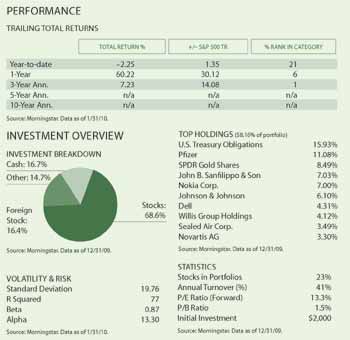Free cash flow tops the list of the Appleseed portfolio's valuation screens, but the managers also look at other value gauges of a company, such as its book value and what prices investors have paid for similar private entities. The fund views earnings with some skepticism, since companies can easily manipulate them. It favors a company with low levels of debt whose own managers hold a hefty stock ownership, working in an industry where it has a defensible competitive advantage and its rivals face high barriers to entry. Appleseed will sell a stock once it reaches its intrinsic value or once the fund managers' estimate of that value changes. Appleseed will also sell when a company's SRI profile worsens, or when the portfolio managers find better opportunities elsewhere.
To achieve the SRI reputation in the first place, companies must fit the Appleseed team's definition of what a good corporate citizen is, and have strong records on the environment, human rights and community investment. Transparent reporting and a prudent allocation of capital are also musts. The fund eliminates companies that generate substantial revenues from tobacco, alcohol, gambling, weapon systems or pornography, as well as those with operations or direct investment in Myanmar or Sudan.
While it's difficult to pinpoint exactly how much the fund's sustainability criteria have aided its performance, the screens clearly helped in 2007 when Appleseed eliminated its large position in Citigroup. "We started reading reports about off-balance-sheet liabilities and the losses the bank was taking," Adam Strauss says. "The decision to sell came a few days later, when third-quarter earnings came in well below expectations. It became apparent at that point that Citigroup and other banks would take a huge earnings hit and need to raise capital." Although other fund holdings fell in 2008, many held up better than the overall market. Appleseed's overweight position in defensive health care stocks, along with its cash positions of up to 10%, also stemmed losses.
In 2009, however, those same health-care positions dragged down performance, at a time when concerns over health care reform have been growing. Another hindrance was the fund's cash position, which reached about 20% by midyear and has remained close to that ever since. Still, those problems were eclipsed by the solid showings of the fund's other stock picks-a few of which turned out to be home runs.
Among the latter was John B. Sanfilippo & Son, the owner of the Fisher nut brands and the largest private label producer in the United States. The stock, a longtime favorite that Ron Strauss began buying in the early 1990s, fell precipitously in 2008 when hedge funds and mutual funds unloaded it. But the Appleseed managers held on and added to the position in 2009 while it traded at a stunningly cheap two times free cash flow. They liked the stock so much that at one point last year it accounted for more than 17% of the fund's assets.
"Even today, it's trading at well below tangible book value," says Adam Strauss. "It also has a free cash flow yield of 15% to 20%. We get excited with a 10% cash flow yield." As far as the socially responsible aspect of Sanfilippo's business, Strauss points out that it uses fewer resources to grow protein products than it does to raise cattle or chickens.
Other winning fund picks in 2009 were the call center operator ICT Group. Appleseed's managers added this company to the fund in early 2009 and had more than doubled their holdings by the end of the third quarter. Appleseed also added Schering-Plough, which was acquired by Merck.
With more than one-fifth of its assets invested in pharmaceutical companies, the fund is taking a favorable stance on an industry that many investors view cautiously in an era of health-care reform. But Adam Strauss believes an aging population and consistent product demand make the stocks a good, cheap defensive play this year.
"Pharmaceuticals lagged in 2009, and that's one of the reasons we like them now," he says. "These companies conduct business around the world, so health-care reforms in the U.S. won't have a significant impact. And regardless of what happens with reform, someone-whether it's the government or the consumer-will need to pay for drugs." A recent addition to the group, Novartis, was added late last year when the stock sold at just 11 times earnings. Adam Strauss likes the company's drug pipeline and its diversified product offerings.
Mingling with the giants Novartis and Coke are less-well-known companies such as longtime holding Gaiam, a maker of lifestyle products ranging from green home furnishings to yoga wear. Gaiam also owns a majority stake in a company that installs solar panels, which gives the Appleseed Fund a backdoor exposure to alternative energy. Another less-well-known holding, Female Health Company, makes female condoms that government agencies distribute to women in developing countries to curb the spread of sexually transmitted diseases. As a result of the significant increases in government funding, the demand for Female Health's products should increase by a compounded growth rate of at least 20% over the next five years, says Adam Strauss.










